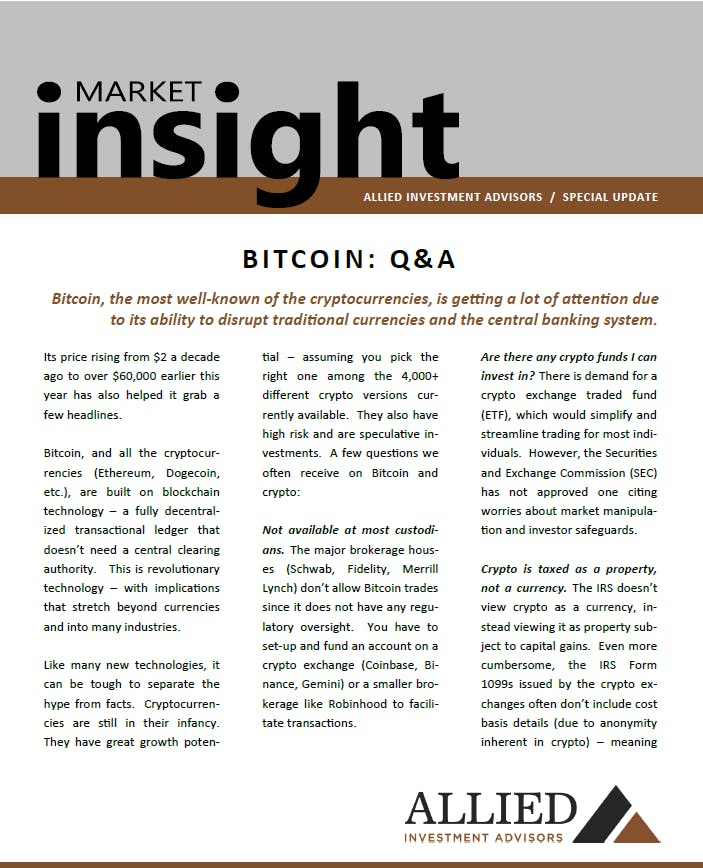Special Update: Bitcoin Q&A
June 30, 2021
Bitcoin, the most well-known of the cryptocurrencies, is getting a lot of attention due to its ability to disrupt traditional currencies and the central banking system.
Its price rising from $2 a decade ago to over $60,000 earlier this year has also helped it grab a few headlines.
Bitcoin, and all the cryptocurrencies (Ethereum, Dogecoin, etc.), are built on blockchain technology – a fully decentralized transactional ledger that doesn’t need a central clearing authority. This is revolutionary technology – with implications that stretch beyond currencies and into many industries.
Like many new technologies, it can be tough to separate the hype from facts. Cryptocurrencies are still in their infancy. They have great growth potential – assuming you pick the right one among the 4,000+ different crypto versions currently available. They also have high risk and are speculative investments. A few questions we often receive on Bitcoin and crypto:
Not available at most custodians. The major brokerage houses (Schwab, Fidelity, Merrill Lynch) don’t allow Bitcoin trades since it does not have any regulatory oversight. You have to set-up and fund an account on a crypto exchange (Coinbase, Binance, Gemini) or a smaller brokerage like Robinhood to facilitate transactions.
Are there any crypto funds I can invest in? There is demand for a crypto exchange traded fund (ETF), which would simplify and streamline trading for most individuals. However, the Securities and Exchange Commission (SEC) has not approved one citing worries about market manipulation and investor safeguards.
Crypto is taxed as a property, not a currency. The IRS doesn’t view crypto as a currency, instead viewing it as property subject to capital gains. Even more cumbersome, the IRS Form 1099s issued by the crypto exchanges often don’t include cost basis details (due to anonymity inherent in crypto) – meaning you personally need to track and report your tax details.
What is bitcoin mining? As a decentralized network, someone has to be the auditor of the system. Enter the miners: people with sophisticated computers that monitor transactions and ensure validity. For this service, the miner that verifies the transaction and has the fastest completion time on a digital puzzle is awarded an amount of Bitcoin (up to a certain threshold).
Is Bitcoin a digital version of gold? Like gold, Bitcoin should be a good inflation fighter and a hedge against volatility in the US economic system. However, it also suffers some of the same drawbacks as gold. Famed investor Warren Buffett has noted that gold has “no utility,” that it’s just “a shiny yellow rock.” Bitcoin critics say the same thing about it – that its value is based on perception, not fundamentals.
Will crypto become a global currency? Many countries have gotten into the habit of debasing their currency, sparking calls for a better, less manipulatable system. Crypto is one possible answer. We are, however, a long way from this being implemented, and how it will play out is yet to be seen. Independent currencies didn’t work pre-Civil War, what will make them work this time? Will there be some middle ground, where countries use the benefits of blockchain, while still maintaining their own currency? Will pricing be stable enough to make every day purchasing logistics feasible?
An investment in Bitcoin is a speculative position. Anyone building a position should size it appropriately for high volatility. In early 2021, Bitcoin dropped -48% (a drawdown we’re still in the middle of). In 2018, Bitcoin saw an -83% pullback. In 2013-2014, it saw an -82% drawdown. Do you have the investing discipline and timeframe to ride through an -80% correction every 3-5 years?
One final item: cybersecurity is important! The peer-to-peer blockchain network is great for monitoring transactions and keeping fraud out of the internal system. However, should you lose your wallet password, or even worse, get hacked, the anonymity of the systems makes it easy for your digital currency to disappear!
If you have any questions about bitcoin, the market, your account, or just need an update, please reach out to any one of our team members at (406) 839-2037 to schedule a meeting.

